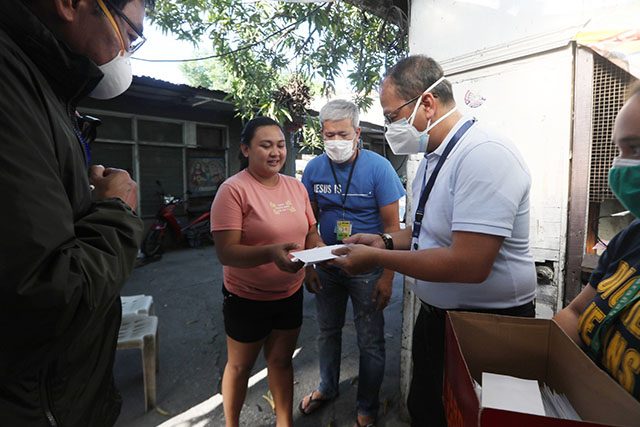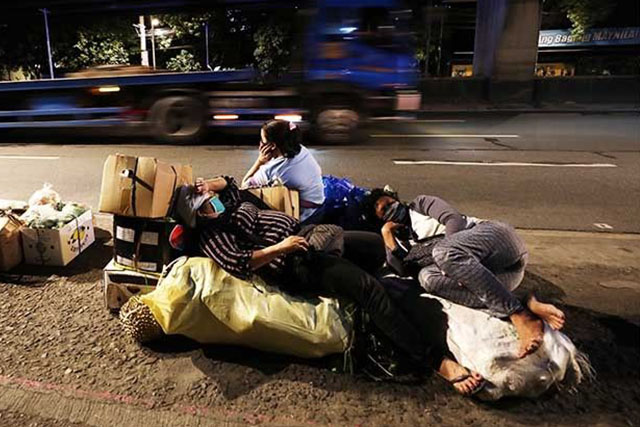
The Department of Social Welfare and Development recently issued an advisory discouraging public solicitation as various groups and individuals foster “bayanihan” spirit in view of the enhanced community quarantine to support fellow Filipinos.
The DSWD reminded the public that soliciting for donations is regulated by the law, particularly Presidential Decree 1564 or the Solicitation Permit Law.
This gives the agency an authority to “regulate the solicitation of donations and receiving of contributions for charitable or public welfare purposes.”
The advisory was originally posted on its social media pages but it has been removed as of writing. Some Filipinos managed to take a screengrab of the now deleted advisory.
THIS deserves a public condemnation!
Why would the gov’t limit the initiatives of private sectors to solicit & conduct relief operations in times of a public health crisis?
Is it because they feel their incompetence that private sectors/NGOs are doing better than the gov’t? pic.twitter.com/hwr39v499T
— Pamalakaya Pilipinas (@pama_pil) April 15, 2020
“It has come to our attention that amidst the COVID-19 pandemic, various persons and organizations are allegedly conducting unauthorized public solicitation activities,” part of the advisory read.
The social welfare department added that under the Solicitation Permit Law, “no person or organization shall conduct any form of solicitation in the country without first securing a permit” from the agency.
“The DSWD reiterates that all entities must apply for a solicitation permit with the nearest DSWD office, which has jurisdiction over the area where one wishes to conduct the solicitation activity,” the post continued.
The agency also said that the public can apply for the permit online and pay the processing fee through state-run Land Bank of the Philippines or online bank transfer.
In a press briefing on Thursday, the DSWD explained that the advisory was released “to ensure solicitations are properly planned” and to avoid scams or illegitimate drives.
“To ensure solicitations are properly planned, we need to know where are the areas that we need to serve and solicit so we will be able to determine and monitor whether these solicitations were used for its intended purpose,” the agency said.
The DWSD added that it will also decide whether the purpose of the solicitation and donation drives are “justified.”
Suspend implementation of Solicitation Permit Law
The advisory raised eyebrows of some Filipinos, including former DSWD Secretary Judy Taguiwalo who called on the agency to “suspend its implementation” in the middle of a global health crisis.
“It is legal yes but is it in consonance with the huge humanitarian demands to address the COVID-19 pandemic? Definitely not,” she wrote on Facebook.
Taguiwalo acknowledged that the pandemic has become a “major socio-economic issue” and cited that millions of Filipinos have already lost their initial sources of income due to the effects of the enhanced community quarantine which suspended onsite work.
“Given the magnitude of those in need of assistance, government’s response at the national and local level should welcome efforts by the private sector including business, civil society organizations and individuals to assist in relief operations to mitigate the hunger and dislocation of communities especially the poor,” she added.

“We are under emergency situation, allow the private sector including organizations and individuals to help! Suspend the implementation of the registration requirement for solicitation under the present COVID crisis,” Taguiwalo continued.
She also shared that some people have been telling her that they “are losing legitimate fundraisers” because of the advisory.
Bayanihan vs Bureaucracy
Fishers group Pamalakaya Pilipinas also questioned the advisory and stressed that the nation is under a “public health crisis.”
A Twitter user similarly questioned the advisory’s purpose and asked, “To think that people are willing to give their own money and are offering their labor to help. Akala ko ba bayanihan?”
RELATED: Real ‘bayanihan’ spirit: How ordinary Filipinos are helping communities this quarantine period
Singer Leah Navarro also tweeted that it is a form of “bureaucracy” that delays the delivery of aid and support to Filipinos in need.
“Not a very compassionate move. DSWD must control solicitation? Why add another layer of bureaucracy to delay delivery of aid?” she wrote.
House Deputy Speaker Luis Raymund Villafuerte previously slammed the DSWD for its “bureaucratic” rules that caused a delay in the release of the cash subsidy for low-income households affected by the enhanced community quarantine.
He accused it of lacking “any sense of urgency” and “taking its own sweet time in implementing a cumbersome set of rules.”
On Thursday, DSWD Director III Irene Dumlao clarified that it “took down the post to review the guidelines on public solicitation.”
She added that the agency would “make the process more responsive to the emergency situation and harmonize it with the resolution of the IATF on public solicitation.”
“This includes automating the process and waiving the application fees,” Dumlao added in a message sent to the members of the press.
The DWSD in a separate statement released Thursday said that it is already “urgently” rolling out the cash subsidies under the Social Amelioration Program that provides vulnerable sectors P5,000 to P8,000, depending on their region’s minimum wage rate.
It reported that:
“As of April 15, a total of 1,239 LGUs were provided with funds amounting to P67.5 Billion. A total of 282,954 low income families who are not beneficiaries of the Pantawid Pamilyang Pilipino Program have received their emergency cash assistance, equivalent to P1.57 billion.”
Reports said that Filipinos have been experiencing the pitfalls of bureaucracy amid the implementation of the government’s programs in relation to the COVID-19 quarantine.
Foreign medicine professors believe that governments around the world should find ways “to reduce bureaucracy and red tape, speed up decision-making and make the system more responsive” in light of public emergencies like a pandemic.









